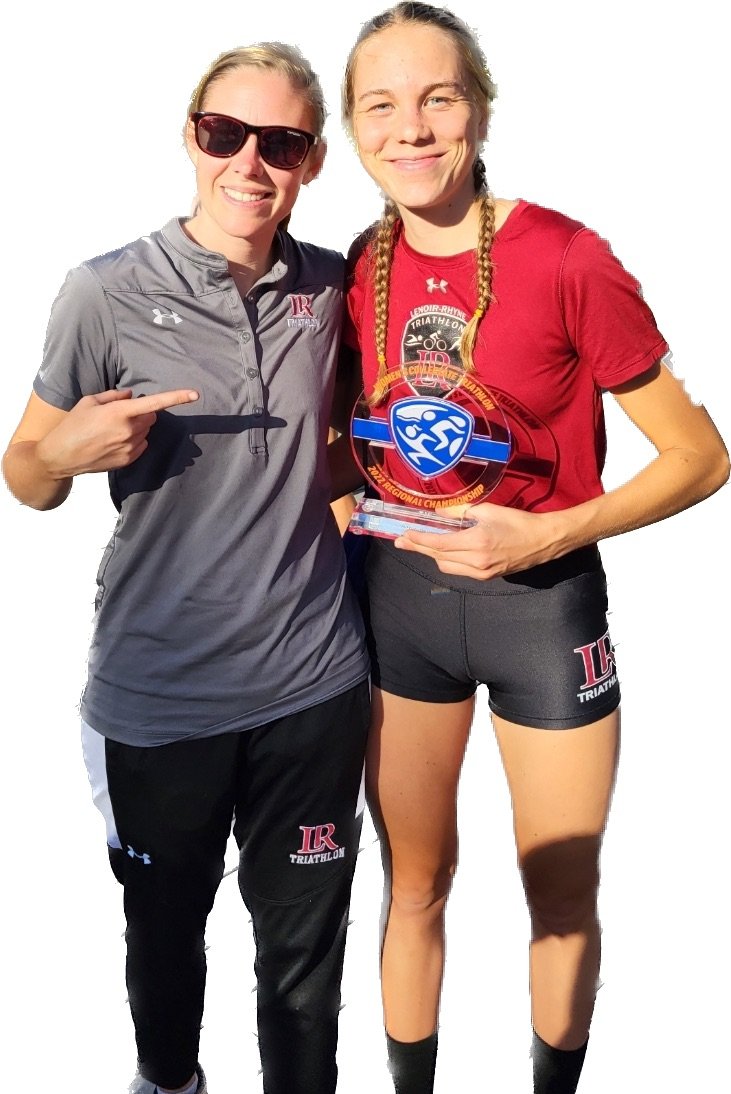NCAA Triathlon
The Opportunities are AMAZING!!
In January 2014, the NCAA voted to officially recognize triathlon as an Emerging Sport for Women across its Division I, Division II, and Division III member institutions. This designation paves the way for triathlon to potentially become a fully sanctioned NCAA Championship Sport. Female triathletes can now compete in draft-legal racing and enjoy the status of official NCAA student-athletes.
There are currently 40 institutions that have official varsity NCAA programs. That is a lot of programs and more are added frequently! Triathlon is rapidly growing among teenagers-but many don’t know about the opportunity to compete at the NCAA Level. I hope this will broaden your perspective as you continue reading!
Triathlon as a sport as an image of being grueling and taking a long time to compete and train. When you say that you are competing in triathlon at the university level——clearly YOU MUST BE FAST. And then, 95% of the athletes think they aren’t “enough.” But you are!
Here is additional information to consider…
Most people think of IRONMAN when they think of triathlon. Ironman races are very long races. That is NOT what the NCAA and high school programming is about. High Schoolers and NCAA athletes compete at distances that take just over an hour to complete!
The popularity of Ironman racing (super long events) has effected the understanding of triathlon for the general public.
NCAA, high school and junior division for triathlon are sprint distances- 750 swim/ 12 mile bike/ 3 mile run. Some are even SUPERSPRINTS- 400 m swim/ 6 mile bike/ 1.5 mile run!! Who knew???
Most triathletes participate in non-draft racing events. Non-draft means that you don’t ride close to other riders.
Draft-legal racing is the format that is used in the NCAA and the Olympic pathway. USAT has a Junior Development Race Series for athletes on High Performance Development Teams to learn how to race the draft-legal format.
There aren’t that many races for teens to participate— so there is less exposure to the sport. When they do race, they are racing adults.

The Performance Triathlon Camp can help by teaching the athletes the basics of understanding triathlon, the skills needed in draft-legal racing, and provide them with opportunities to understand the sport to see if this is something they might be interested in pursuing.
-
Any high school athlete who can swim, run and ride a bike. Many freshman haven’t even completed a triathlon upon their recruitment they are looking for confident athletes who want to tri something new. Some athletes are swimming and running track in addition to triathlon.
Current non-draft triathletes competing locally.
Current Junior Elite athletes from High Performance Development Teams that have been train specifically in the draft legal format.
Most importantly, they are looking for athletes who have great attitudes and want to learn!
-
You’ll learn:
Triathlon pathways
Proper training techniques
How to talk to coaches for recruitment in swim, bike, run.
-
Yes, because triathlon is growing so rapidly, coaches are ACTIVELY seeking high school swimmers and runners to consider triathlon in college. Especially at the D2 and D3 level! We need athletes to fill the team rosters. Triathlon coaches know how to coach- they know how to build a triathlete.
Some athletes arrive with some triathlon races under their belt, many have minimal or no triathlon coaching prior to college.
Triathlon coaches know is that the athletes only need to have an engine, developed through active sport and the ability to swim. They can turn them into a triathlete—-you’d be amazed at how fast this happens. The coaches are counting on their knowledge of the sport to develop the athlete.
This is how Performance Triathlon Camp can help- we will teach the skills needed to understand the sport!
-
Most of the Junior Elite athletes who participate with a High Performance Development Team already participate in two sports.
Triathlon is essentially cross training for swimming and running sports. A qualified coach can help keep an athlete injury free, motivated through the winter. The “racing season” for high school students is typically late spring through early fall.
Studies have show that Long Term Athlete Development, that includes participation in multiple sports helps athletes avoid burn out.
Coach Kim has found over the years that athletes who use triathlon to cross train, usually find a fire for competing at their other sports. They get stronger cross training and they have more success.
This is a short video explaining the difference of non-draft and draft-legal formats.









